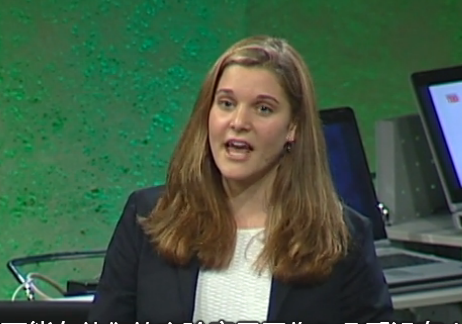So that's what led me to Alzheimer's. I started reading about Alzheimer's and tried to familiarize myself with the research,
這件事激發(fā)了我對阿爾茨海默氏癥的興趣。我開始閱讀相關(guān)的資料,并使自己的熟悉相關(guān)的研究。
and at the same time when I was in the -- I was reading in the medical library one day, and I read this article about something called "purine derivatives."
在同一時間,當我在......有一天,我在醫(yī)學圖書館讀到一篇文章,是關(guān)于嘌呤衍生物的。
And they seemed to have cell growth-promoting properties. And being naive about the whole field, I kind of thought,
他們似乎有促進細胞生長的功能,在對這整個領(lǐng)域幾乎一無所知的情況下,我試想,
"Oh, you have cell death in Alzheimer's which is causing the memory deficit, and then you have this compound -- purine derivatives -- that are promoting cell growth."
“哦,阿爾茨海默癥中會有細胞死亡,這導致了記憶減退,現(xiàn)在有這種化合物——嘌呤衍生物——可以促進細胞的生長。”
And so I thought, "Maybe if it can promote cell growth, it can inhibit cell death, too."
所以我想,“如果它能促進細胞生長,它也可以抑制細胞死亡。”
And so that's the project that I pursued for that year, and it's continuing now as well,
那一年我都在研究這種可能性,研究進行的很順利,
and found that a specific purine derivative called "guanidine" had inhibited the cell growth by approximately 60 percent.
我發(fā)現(xiàn)了一種叫做胍的嘌呤衍生物,可以抑制約60%的細胞生長。
So I presented those results at the International Science Fair, which was just one of the most amazing experiences of my life.
我向國際科學博覽會提交了這項成果,這是我一生中最難忘的經(jīng)歷之一。

And there I was awarded "Best in the World in Medicine," which allowed me to get in, or at least get a foot in the door of the big medical world.
我被授予“世界最佳醫(yī)學”榮譽,這使我進入了,或者至少邁出了我在醫(yī)學研究領(lǐng)域的第一步。
And from then on, since I was now in this huge exciting world, I wanted to explore it all. I wanted it all at once, but knew I couldn't really get that.
從那時起,既然我進入了這個精彩紛呈的世界,我想探索一切。我希望能馬上了解一切,但也知道很難做到這一點。
And I stumbled across something called "cancer stem cells." And this is really what I want to talk to you about today -- about cancer.
一個偶然的機會我了解到癌癥干細胞的存在,這也是我今天真正想和大家討論的主題——癌癥。
At first when I heard of cancer stem cells, I didn't really know how to put the two together.
起初,我聽到癌癥干細胞這個名詞,我真的不知道“癌癥”和“干細胞”這兩者是如何結(jié)合起來的。
I'd heard of stem cells, and I'd heard of them as the panacea of the future -- the therapy of many diseases to come in the future, perhaps.
我聽說的干細胞,是未來的靈丹妙藥——假以時日,或許可以治愈許多疾病。
But I'd heard of cancer as the most feared disease of our time, so how did the good and bad go together?
但是,我也聽說癌癥是這個時代最可怕的疾病,所以好的和壞的究竟是怎么結(jié)合到一起的?
Last summer I worked at Stanford University, doing some research on cancer stem cells.
去年夏天,我到斯坦福大學做了一些有關(guān)癌癥干細胞的研究。
And while I was doing this, I was reading the cancer literature, trying to -- again -- familiarize myself with this new medical field.
這段時間,我讀了很多有關(guān)癌癥的文獻,試圖讓自己熟悉這一新的醫(yī)學領(lǐng)域。
And it seemed that tumors actually begin from a stem cell. This fascinated me. The more I read, the more I looked at cancer differently and almost became less fearful of it.
我了解到,腫瘤確實是從干細胞開始的,這使我著迷。我讀的文獻越多,對癌癥的的了解就越多,幾乎不再懼怕癌癥了。



